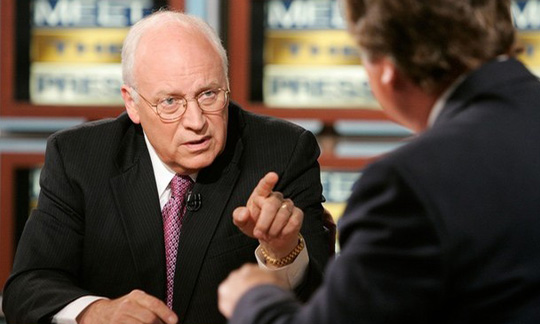This week, a video of pre-senate Rand Paul surfaced where he more than speculated that Dick Cheney’s push for the Iraq War was a money grab for his former employer Halliburton.
Videos by Rare
The video prompted Liz Cheney, the former vice president’s daughter, to tell Washington Post’s Jennifer Rubin that Paul’s statement “[Wasn’t] surprising since Senator Paul often seems to get his foreign policy talking points from Rachel Maddow.”
John Bolton, who served as ambassador to the United Nations during George W. Bush’s presidency, also took issue with the remarks, saying in an email to Right Turn: “Senator Paul should repudiate his remarks and apologize to Vice President Cheney.”
But, while we’re on the subject of Iraq, remember Saddam Hussein? Remember that time[s] Cheney blamed the 9/11 attack on Saddam with no support of government intelligence?
 These questions raise a broader one. What’s truly more far-fetched or absurd: Rand Paul pointing out that Cheney was still collecting a check from Halliburton at the start of a war that made the company a reported $39.5 billion or starting a war over an unfounded assertion?
These questions raise a broader one. What’s truly more far-fetched or absurd: Rand Paul pointing out that Cheney was still collecting a check from Halliburton at the start of a war that made the company a reported $39.5 billion or starting a war over an unfounded assertion?
Dick Cheney’s biographer Stephen F. Hayes wrote in 2003 that “Osama Bin Laden and Saddam Hussein had an operational relationship from the early 1990s to 2003 that involved training in explosives and weapons of mass destruction, logistical support for terrorist attacks, al Qaeda training camps and safe haven in Iraq, and Iraqi financial support for al Qaeda — perhaps even for Mohamed Atta — according to a top secret U.S. government memorandum obtained by The Weekly Standard.”
This “operational relationship” caused Hayes to conclude that “there can no longer be any serious argument [to the contrary] about whether Saddam Hussein’s Iraq worked with Osama bin Laden and al Qaeda to plot against Americans.”
Unfortunately for Hayes, there were plenty of serious arguments.
First, Newsweek responded with an article that found the memorandum “[didn’t] actually contain much ‘new’ intelligence at all.” Second, a 9/11 panel nixed the idea of there being “credible evidence” of an Iraq-al Qaeda alliance.
Third, a Washington Post article argued that Dick Cheney made numerous private assertions that “crossed so far beyond the known universe of fact that they were simply without foundation.” That was corroborated by former House majority leader (R-Texas) Richard K. Armey, who said Cheney told him privately that “we now know they have the ability to develop these weapons in a very portable fashion, and they have a delivery system in their relationship with organizations such as al-Qaeda.”
Armey then asked, “Did Dick Cheney … purposely tell me things he knew to be untrue?”
He continued, “I seriously feel that may be the case … Had I known or believed then what I believe now, I would have publicly opposed [the war] resolution right to the bitter end, and I believe I might have stopped it from happening.”
Armey may have been on to something. As early as 2004, Cheney began denying that he’d ever linked Saddam Hussein and al Qaeda.
By 2008, Cheney had backstepped on the term “operational link,” but he still maintained that there was a link between Iraq and al Qaeda.
“Well, this is no operational link,” Cheney said, “But there was, as I recall from looking at it, extensive links with Egyptian Islamic Jihad. Egyptian Islamic Jihad was the organization headed by Zawahiri, and he merged EIJ with Al Qaeda when he became the deputy director of Al Qaida, Osama bin Laden’s number two. Now, was that a link between Iraq and Al Qaeda? Seems to me pretty clear that there was.”
Where was the threat and the cause-of-action if there was no “operational link?”
If Rand Paul needs to apologize for questioning the motives of Liz Cheney’s father, what then must the apology be for the families of the 4,489 troops that died in a war that was launched on specious, unverifiable intelligence guesses?
Who will apologize to the 70 percent of Americans who believed Saddam Hussein was behind 9/11 when the Iraq war began?
What, or who, might have given them this idea in the first place?
USA Today reported in September 2003, “Nearly seven in 10 Americans believe it is likely that ousted Iraqi leader Saddam Hussein was personally involved in the Sept. 11 attacks… President Bush and members of his administration suggested a link between the two in the months before the war in Iraq. Claims of possible links have never been proven, however.”
Cheney still has his staunch supporters and so does Rand Paul. But it’s time for Republican hawks to quit trying to seat Sen. Paul at the foreign policy kids’ table considering their own record.


